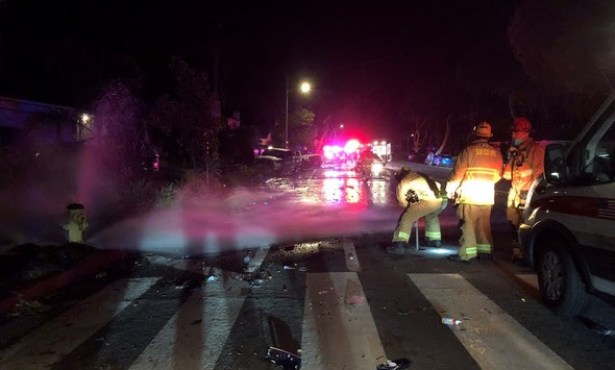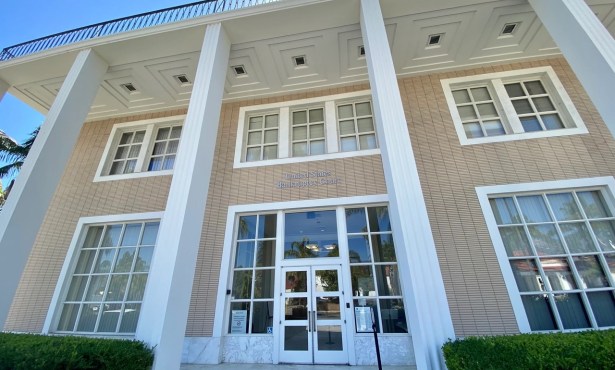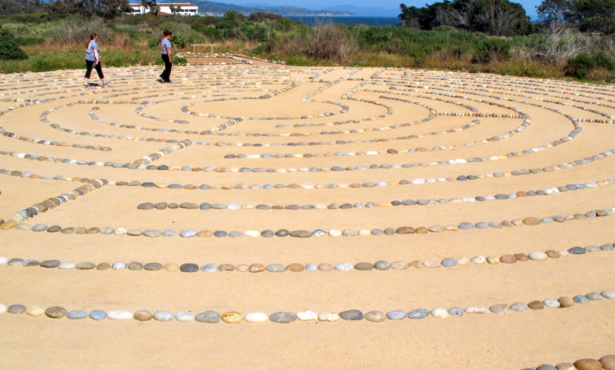‘Today the Devil Loses’: Golden State Killer Sentenced to Life Without Parole
Joseph DeAngelo Gets 12 Life Sentences for Murder, Rape, Kidnap

Joseph DeAngelo — the mass murderer and serial rapist known as the Golden State Killer, who admitted to killing 13 people and raping dozens more across California during the 1970s and ’80s — rose unsteadily to his feet on Friday morning in the Sacramento State University Ballroom, where his sentencing was held to accommodate the large number of victims and their family members in attendance. “I’ve listened to all your statements, each one of them,” he told those gathered for his sentencing. “And I am really sorry for everyone I hurt.”

DeAngelo’s words, delivered haltingly, were his only acknowledgement that he had heard the heart-wrenching statements delivered by his victims and victims’ family members over the prior three days. He had otherwise sat stoically, staring straight ahead while survivors of the murdered described their attempts to regain normalcy and rape victims explained how fear had dominated their lives — using words like “despicable” and “evil” to describe the man who had terrorized so many since his first known victim, Claude Snelling, was murdered by DeAngelo in 1975 in Visalia.

Before DeAngelo was sentenced to 11 consecutive life sentences without parole for his crimes, one of the most powerful judgments on the cruel torment he had inflicted came on Thursday from Debbi Domingo McMullan, daughter of Cheri Domingo, who was brutally killed in Goleta in 1981. As she tried to keep her voice steady but paused occasionally, racked with emotion, Domingo McMullan described her mother’s persistence and love, and the charming joy of her friend, Greg Sanchez, who was also DeAngelo’s victim that night. Domingo McMullan had spent the night at a friend’s house, and in the 40 years since her mother’s death when she was 15, she said, “only now am I understanding the impact of losing my mother in a violent way. When I was first stopped at the yellow crime scene tape around my house, I knew my life was changing.”
Get the top stories in your inbox by signing up for our daily newsletter, Indy Today.
She went on to say she was surrounded with love when she lived with her father and step-family in San Diego, but she could never grab hold of her life. Her only laugh came as she said, “If Mom were alive, she would have nagged me early on to stop settling for less … to dream more … that I could do better, deserved better. Optimism was her gift, along with love and determination.”
As a teenager, Domingo McMullan said, “I pretended to be an okay version of me.” Once an outstanding student, she dropped her university plans, eventually becoming addicted to methamphetamine. For years, she relived her mother and Sanchez’s deaths in her dreams. It wasn’t until her two children were taken away at age 30 that she struggled back to sobriety, avoided suicide, and felt a miracle through Jesus Christ, she said.
“I’m sorry, I can’t see through my tears,” Domingo McMullan said at one point. For the past 20 years she has been a “voice and advocate for the many, many victims in this series of crime.”
In a curse directed at DeAngelo, Domingo McMullan said she would settle for seeing him shackled and humiliated, “nervous as hell because everyone around him in prison will know exactly who he is and exactly what deplorable actions he’s done. Today, the devil loses.”
Her brother, David Domingo, also spoke, saying that the shock he’d been in since hearing of the death of his mother — who had “impeccable style,” listened to records with them, and “took us on cool trips” — had never left him.
“I’ve cried very few times in my life since 1981, over this or anything else,” he said. At the age of 14, he learned that he couldn’t talk with his friends about his mother and the vile things DeAngelo had done. “It was too rough,” he said. He acknowledged the only justice he’d see for the torture and murder of his mother, while imperfect, would be that the last words DeAngelo heard outside prison were damning.
Brian Sanchez, speaking for Greg Sanchez’s family, also noted what felt like the lack of true justice for his family’s grief. He compared DeAngelo to the coronavirus, saying that “injecting disinfectant into this virus is probably not a bad idea.” He expressed his frustration after hearing victim family after victim family speak and having to answer his young son’s questions about how the murders could go unsolved for so long.
“He [DeAngelo] was a police officer,” Sanchez noted, and was adaptive, smart, and cunning. “He knew the likelihood that each jurisdiction wanted to solve its own case” and that a lack of cooperation and coordination had prolonged finding the murderer. The wait had been crippling, Sanchez said, and he hoped the ordeal of the trial was the beginning of the end. He said that their memories of Greg Sanchez would not be tarnished by it all: “He was in the prime of his life at 27. He had all his dreams ahead of him, a big presence with a big smile.”
In 1979, DeAngelo, an ex-cop whom law enforcement believed had worked as a painter in Goleta, committed his second known set of homicides, the deaths of Debra Alexandria Manning and Robert Offerman. Manning’s friends and colleagues Roseanne Howard and Natasha Holiday spoke of how “Ally” had felt Opperman’s “big yellow Mercedes parked at the door to the condo was like a lion protecting her” because she felt like she was being followed, she told them in a phone call. The next day, DeAngelo broke into Offerman’s condo through a sliding glass door, tying them both, raping Manning, and shooting them. At some point, DeAngelo ate the leftovers from their Christmas dinner.
Howard and Holiday had met Manning at Boston Hospital during a neurology internship, they said. A deep friendship developed, and they expressed the loss of her presence and love for their children and grandchildren across the years. “She’d been denied the professional accomplishments” they’d experienced, they mourned. Her patients in the Santa Maria community where she’d practiced had sent heartfelt letters and drawings, they said, “a testament to how much they valued her.” The murders had repercussions for her patients, too, Howard and Holiday said, who were left to cope with the horrific details of the rape and murders.
DeAngelo was finally captured at his home in the Northern California city of Citrus Heights in 2018. By then, he was 72 years old, having retired the year before from his job as a mechanic with the SaveMart distribution center in Roseville. The DNA he’d left at crime scenes had been saved, notably by a medical examiner in Ventura, and was used to identify the relatives of a suspect who was known as the Visalia Ransacker, East Area Rapist, Original Night Stalker, and Golden State Killer. Investigators narrowed the search to men of the right age and general location. In exchange for life in prison in lieu of the death penalty, DeAngelo admitted to crimes of first-degree murder, rape, kidnap, robbery, burglary, and false imprisonment against 87 people at 53 crime scenes over the years 1975 to 1986.
Santa Barbara County District Attorney Joyce Dudley was among those seeking the death penalty for DeAngelo when charges were filed in 2019. However, all the county prosecutors accepted the plea deal for life in prison for many reasons related to time, age, and COVID-19. Before the sentences for his crimes were stated, DeAngelo’s attorneys read letters from people who knew DeAngelo as a friend, including a childhood friend who recalled how he hung out with her brothers but seemed estranged from his father, and a niece who said he was her favorite uncle. She expressed her sorrow for the victims of a man she didn’t recognize from their descriptions of a monster.
In an unusual statement from the court, the presiding judge, Michael Bowman, discussed the age of the witnesses and the lengthy time any trial would take. Inmates currently average 30 years on death row, Bowman said before pronouncing DeAngelo’s fate, and it was unlikely all the victims would see justice served as they would this day. DeAngelo, now 74 years old, deserved no mercy, Bowman affirmed, and “will see the rest of his natural life behind the walls of state prison.” He said to DeAngelo, “The impact of the victims’ statements will always be with me. I have been moved by their strength, courage, and grace … all qualities that you lack.”
In her closing statement, prosecutor Dudley spoke eloquently of learning about rape and its impact on not just the victim but also the witnesses, who saw and heard the pain and terror of the victim. As a lawyer 25 years ago, she began to understand the toll of living through such an experience, and DeAngelo knew this too, she said. “He wanted to take the infliction of human pain to the highest level possible. Therefore, he often ensured that their loved ones saw or heard his victims being tortured or killed. That’s just who Joseph DeAngelo is.”
Dudley turned her remarks personal, expressing her experience with great personal loss: “It leaves a hole in your heart that you hope will never heal. You loved them so very much.” But she offered the families counsel that if they felt they needed to know every detail of their loved one’s death before they could begin the healing process, “I believe that what you need to know is what you already know. In life, you loved them, and they loved you,” she said. “Now that this case is finally over … focus on the things that made them lovable. Let those memories allow you to smile again.”
She hoped for true healing for all of them: “Knowing that you loved and that you were loved is the most powerful knowledge of all.”
Every day, the staff of the Santa Barbara Independent works hard to sort out truth from rumor and keep you informed of what’s happening across the entire Santa Barbara community. Now there’s a way to directly enable these efforts. Support the Independent by making a direct contribution or with a subscription to Indy+.




You must be logged in to post a comment.